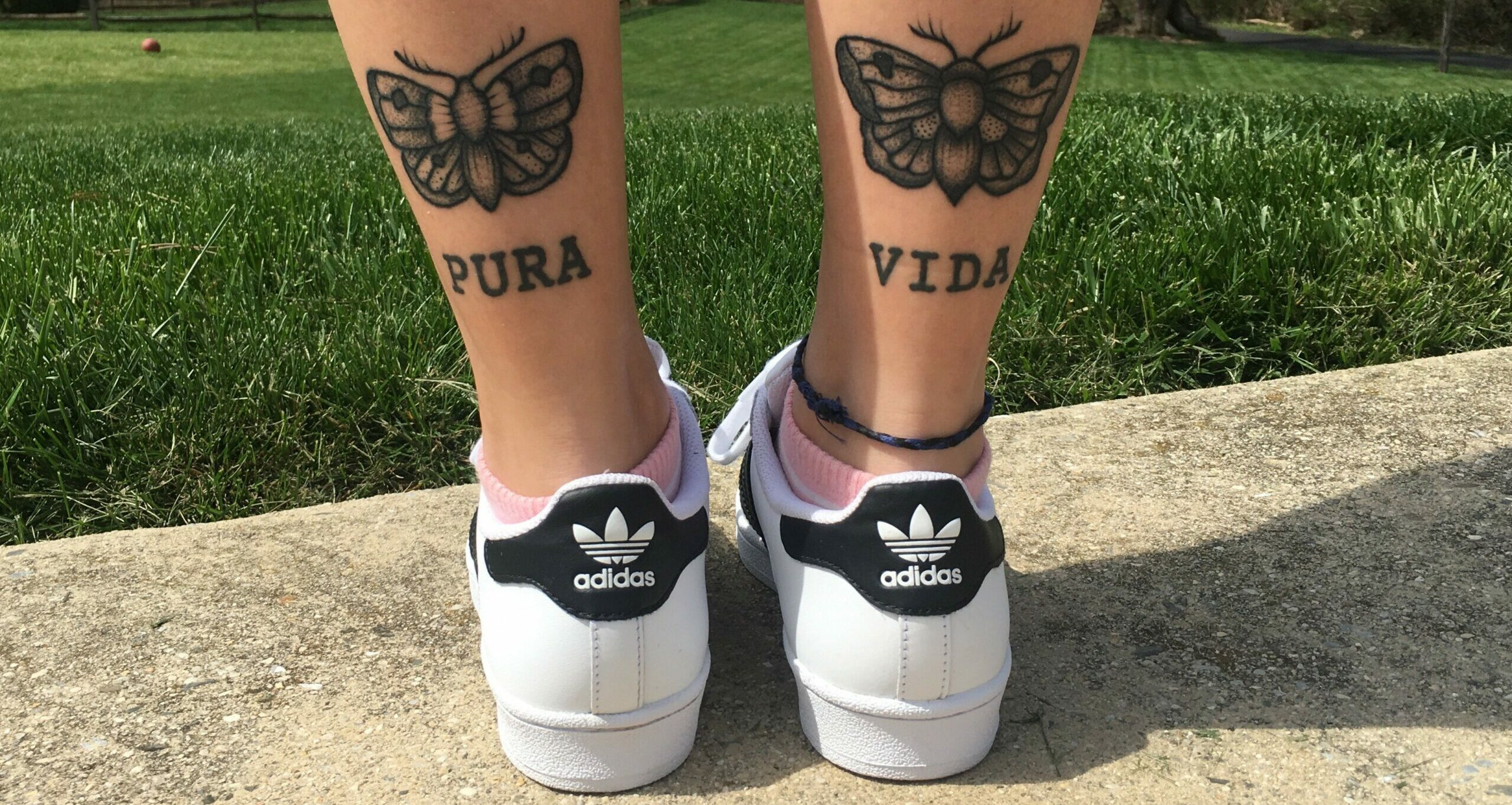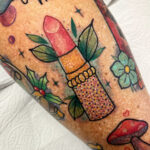Does Eczema Ruin Tattoos? Absolutely not always! At tattooat.com, we understand your passion for body art and the concerns that come with skin conditions like eczema; therefore, let’s explore how to navigate getting inked while managing eczema, ensuring your skin art dreams become a reality, and providing insights on tattoo aftercare and skin health. Discover how to make informed decisions for vibrant, lasting tattoos despite eczema.
1. Understanding Eczema and Its Impact on Tattoos
What is eczema and how does it affect the tattooing process? Eczema, or atopic dermatitis, is a chronic skin condition characterized by inflammation, itching, and dry skin. When it comes to tattoos, eczema can present several challenges, including increased risk of infection, poor ink retention, and potential flare-ups, which can affect the tattoo’s appearance and longevity.
Eczema’s impact on tattoos hinges on understanding how it affects the skin’s integrity and immune response. During a tattoo, the skin is punctured thousands of times, creating tiny wounds. In individuals with eczema, the skin’s barrier function is already compromised, making it more susceptible to irritants and allergens in tattoo inks, according to the American Academy of Dermatology. Furthermore, an overactive immune system can lead to prolonged healing and increase the risk of adverse reactions, such as contact dermatitis. For tattoo enthusiasts, choosing the right design, artist, and aftercare practices is essential for ensuring a safe and successful experience.
2. Key Considerations Before Getting a Tattoo with Eczema
What should you consider before getting a tattoo if you have eczema? Before getting a tattoo, it’s vital to evaluate the severity and stability of your eczema. Factors to consider include avoiding tattoos during flare-ups, consulting with a dermatologist, choosing tattoo locations carefully, and conducting patch tests for ink allergies.
- Severity and Stability of Eczema: Assess how well-controlled your eczema is. Tattoos should only be considered when your skin is calm and stable.
- Consultation with a Dermatologist: Seek advice from a dermatologist to discuss the risks and benefits based on your skin condition.
- Careful Selection of Tattoo Location: Choose areas less prone to eczema flare-ups, avoiding sites with active or recent outbreaks.
- Patch Tests for Ink Allergies: Undergo patch tests to identify potential allergic reactions to tattoo inks before the actual procedure.
3. Choosing the Right Tattoo Artist for Eczema-Prone Skin
How do you select a tattoo artist experienced with eczema? Selecting a tattoo artist who understands eczema is essential for a safe and successful tattooing experience. Look for artists with experience working on sensitive skin, a thorough understanding of hygiene practices, and a willingness to accommodate your specific needs.
- Experience with Sensitive Skin: Choose an artist experienced in tattooing clients with skin conditions like eczema.
- Understanding of Hygiene Practices: Ensure the artist follows strict hygiene and sterilization protocols to minimize infection risks.
- Willingness to Accommodate Needs: Select an artist who is patient, communicative, and willing to adapt their approach based on your skin’s condition.
- Reviews and Referrals: Seek recommendations from others with eczema who have had positive experiences with tattoo artists.
4. Preparing Your Skin Before the Tattoo Appointment
How can you prepare your skin before a tattoo appointment? Prepping your skin is important to minimize potential complications if you have eczema. Key steps include moisturizing regularly, avoiding potential irritants, staying hydrated, and following any pre-tattoo instructions provided by your tattoo artist or dermatologist.
- Moisturize Regularly: Keep your skin well-hydrated in the weeks leading up to your appointment to maintain its barrier function.
- Avoid Potential Irritants: Steer clear of harsh soaps, fragrances, and other irritants that can trigger eczema flare-ups.
- Stay Hydrated: Drink plenty of water to keep your skin hydrated from the inside out.
- Follow Pre-Tattoo Instructions: Adhere to any specific instructions provided by your tattoo artist or dermatologist, such as avoiding certain medications or skincare products.
5. Understanding Safe Tattooing Practices for Eczema
What are the safe tattooing practices for individuals with eczema? Safe tattooing practices are paramount to minimize risks for those with eczema. These include using hypoallergenic inks, maintaining a sterile environment, employing gentle tattooing techniques, and monitoring the skin closely throughout the process.
- Hypoallergenic Inks: Opt for hypoallergenic, high-quality inks that are less likely to cause allergic reactions or irritation.
- Sterile Environment: Ensure the tattoo studio maintains a clean and sterile environment to prevent infections.
- Gentle Tattooing Techniques: Request gentle tattooing techniques to minimize trauma to the skin, reducing the risk of flare-ups and poor healing.
- Close Monitoring of the Skin: Pay close attention to your skin during the tattooing process, alerting the artist to any signs of irritation or discomfort.
6. Navigating Tattoo Aftercare with Eczema
How should you care for a new tattoo if you have eczema? Tattoo aftercare is essential for proper healing and preventing complications if you have eczema. Essential steps include keeping the tattoo clean and moisturized, avoiding harsh products, protecting the tattoo from irritation, and watching for signs of infection or flare-ups.
- Keep the Tattoo Clean and Moisturized: Gently clean the tattoo with mild, fragrance-free soap and water, then apply a thin layer of hypoallergenic moisturizer.
- Avoid Harsh Products: Stay away from harsh soaps, lotions, and ointments that can irritate the skin and trigger eczema flare-ups.
- Protect from Irritation: Protect the tattoo from friction, rubbing, and exposure to potential irritants like clothing, sunlight, and allergens.
- Monitor for Signs of Infection or Flare-Ups: Be vigilant for signs of infection (redness, swelling, pus) or eczema flare-ups (itching, rash), seeking medical attention if necessary.
 Eczema on arm
Eczema on arm
7. Addressing Potential Tattoo Complications in Eczema
What are the potential complications and how to address them? Despite precautions, complications can still arise. Common issues include allergic reactions, infections, keloid formation, and eczema flare-ups, each requiring prompt and appropriate management.
- Allergic Reactions: Treat allergic reactions to tattoo ink with topical corticosteroids or antihistamines, as prescribed by a healthcare professional.
- Infections: Address infections promptly with antibiotics prescribed by a doctor.
- Keloid Formation: Manage keloid formation with corticosteroid injections, laser therapy, or surgical removal, guided by a dermatologist.
- Eczema Flare-Ups: Calm eczema flare-ups with topical corticosteroids, emollients, and by avoiding triggers, under the guidance of a healthcare provider.
8. The Psychological Benefits of Tattoos for Eczema Patients
Can tattoos improve self-esteem for people with eczema? Tattoos can offer psychological benefits for individuals with eczema by boosting self-esteem, promoting body positivity, and providing a sense of control over one’s body image.
- Boosting Self-Esteem: Tattoos can help individuals feel more confident and empowered by reclaiming their bodies and expressing their identity.
- Promoting Body Positivity: Tattoos can shift focus from skin imperfections to artistic expression, fostering a more positive body image.
- Providing a Sense of Control: Choosing and getting a tattoo can give individuals a sense of control over their bodies, helping them feel more at home in their skin.
- Creating a Physical Identity: As Jayne Jezebelle, a tattoo artist, notes, tattoos allow people to create a physical identity not determined by their environment or genetics, enhancing self-confidence.
9. Real-Life Experiences: Tattoos and Eczema
What are the real-life experiences of getting tattoos with eczema? Many individuals with eczema have successfully gotten tattoos. Their experiences highlight the importance of careful planning, communication with artists, and diligent aftercare.
- Positive Outcomes: Some individuals report positive experiences with minimal complications, citing careful planning and diligent aftercare as key factors.
- Challenges and Solutions: Others encounter challenges like flare-ups or ink reactions, emphasizing the importance of working with knowledgeable artists and seeking medical advice when needed.
- Empowerment and Self-Expression: Many individuals express feeling empowered and more confident in their skin after getting tattoos, despite the challenges posed by eczema.
- Community Support: Online communities and forums provide support and shared experiences, offering valuable insights and advice for navigating tattoos with eczema.
10. Long-Term Tattoo Care and Eczema Management
How should you manage your tattoo and eczema long-term? Long-term tattoo care for individuals with eczema involves ongoing management of both the tattoo and the underlying skin condition. This includes maintaining a consistent skincare routine, protecting the tattoo from sun exposure, and seeking prompt treatment for any flare-ups or complications.
- Consistent Skincare Routine: Maintain a gentle skincare routine that includes regular moisturizing and avoiding harsh products to keep the skin healthy.
- Sun Protection: Protect the tattoo from sun exposure by applying sunscreen regularly to prevent fading and skin damage.
- Prompt Treatment for Flare-Ups: Address any eczema flare-ups promptly with appropriate treatments to prevent complications and maintain the tattoo’s appearance.
- Regular Check-Ups: Schedule regular check-ups with a dermatologist to monitor the skin and address any concerns or changes in the tattoo’s appearance.
 Tattoo on Leg
Tattoo on Leg
FAQ: Addressing Your Concerns About Tattoos and Eczema
1. Is it safe to get a tattoo if I have eczema?
It can be, but it requires careful planning and precautions, including consulting with a dermatologist, choosing an experienced tattoo artist, and following strict aftercare practices.
2. Can eczema affect the appearance of a tattoo?
Yes, eczema can cause flare-ups, inflammation, and poor ink retention, which can impact the tattoo’s appearance and longevity.
3. What type of tattoo ink is best for eczema-prone skin?
Hypoallergenic, high-quality inks that are less likely to cause allergic reactions or irritation are recommended.
4. How do I find a tattoo artist experienced with eczema?
Look for artists with experience working on sensitive skin, read reviews and testimonials, and schedule consultations to discuss your specific needs and concerns.
5. What should I do if my tattoo gets infected?
Seek immediate medical attention from a doctor or dermatologist for appropriate treatment, such as antibiotics.
6. Can I use my regular eczema cream on my new tattoo?
Consult with your tattoo artist or dermatologist before using any skincare products on your new tattoo, as some ingredients may interfere with healing.
7. How long should I wait to get a tattoo after an eczema flare-up?
Wait until your skin is completely calm and stable for several months before considering a tattoo.
8. Are there certain areas of the body that are better for tattoos if you have eczema?
Choose areas less prone to eczema flare-ups, avoiding sites with active or recent outbreaks.
9. Can tattoos help improve self-esteem for people with eczema?
Yes, tattoos can boost self-esteem, promote body positivity, and provide a sense of control over one’s body image.
10. How can I protect my tattoo from sun exposure?
Apply sunscreen regularly to prevent fading and skin damage, and consider wearing protective clothing when outdoors.
Conclusion: Making Informed Decisions for Tattoos with Eczema
Navigating the world of tattoos with eczema requires careful consideration, diligent planning, and proactive management. By understanding the risks, taking precautions, and working with knowledgeable professionals, you can make informed decisions that allow you to express yourself through body art while safeguarding your skin health. Whether you choose to pursue a tattoo or not, remember that your journey is unique, and tattooat.com is here to support you every step of the way.
Are you ready to explore the world of tattoos with confidence? Visit tattooat.com today to discover inspiration, find talented artists, and access expert advice tailored to your unique needs. Don’t let eczema hold you back from expressing yourself through body art. Join our community and start your tattoo journey today!
Address: 1825 SW Broadway, Portland, OR 97201, United States
Phone: +1 (503) 725-3000
Website: tattooat.com

